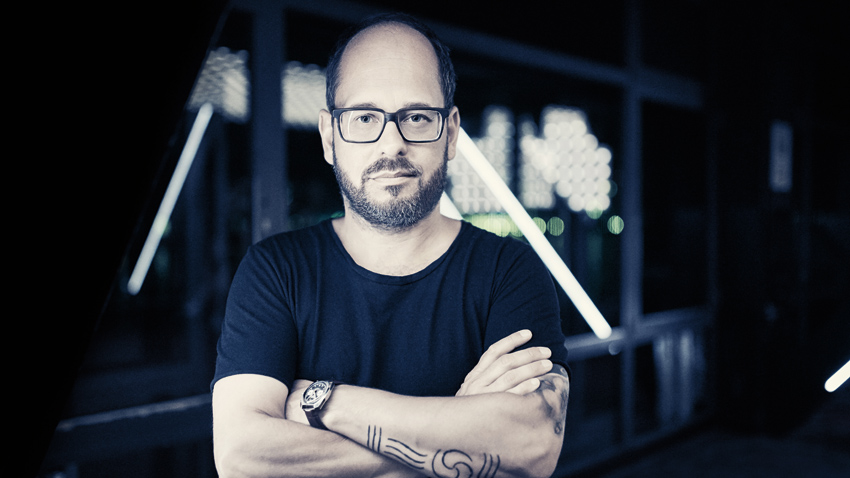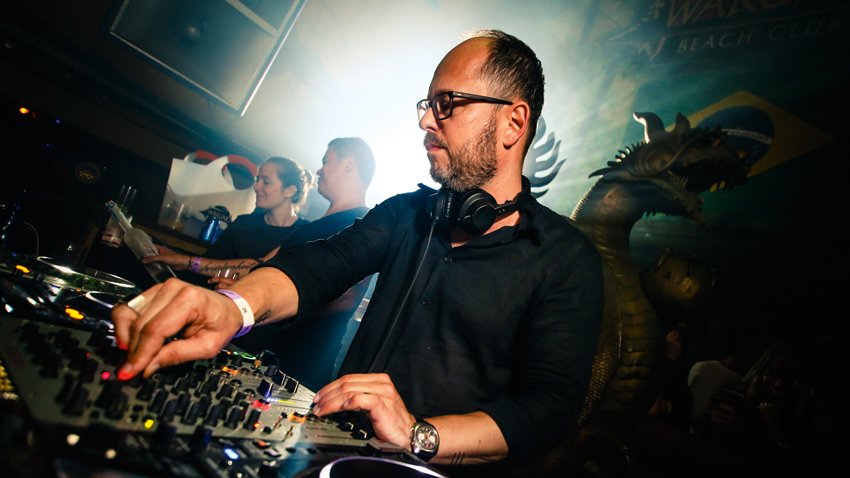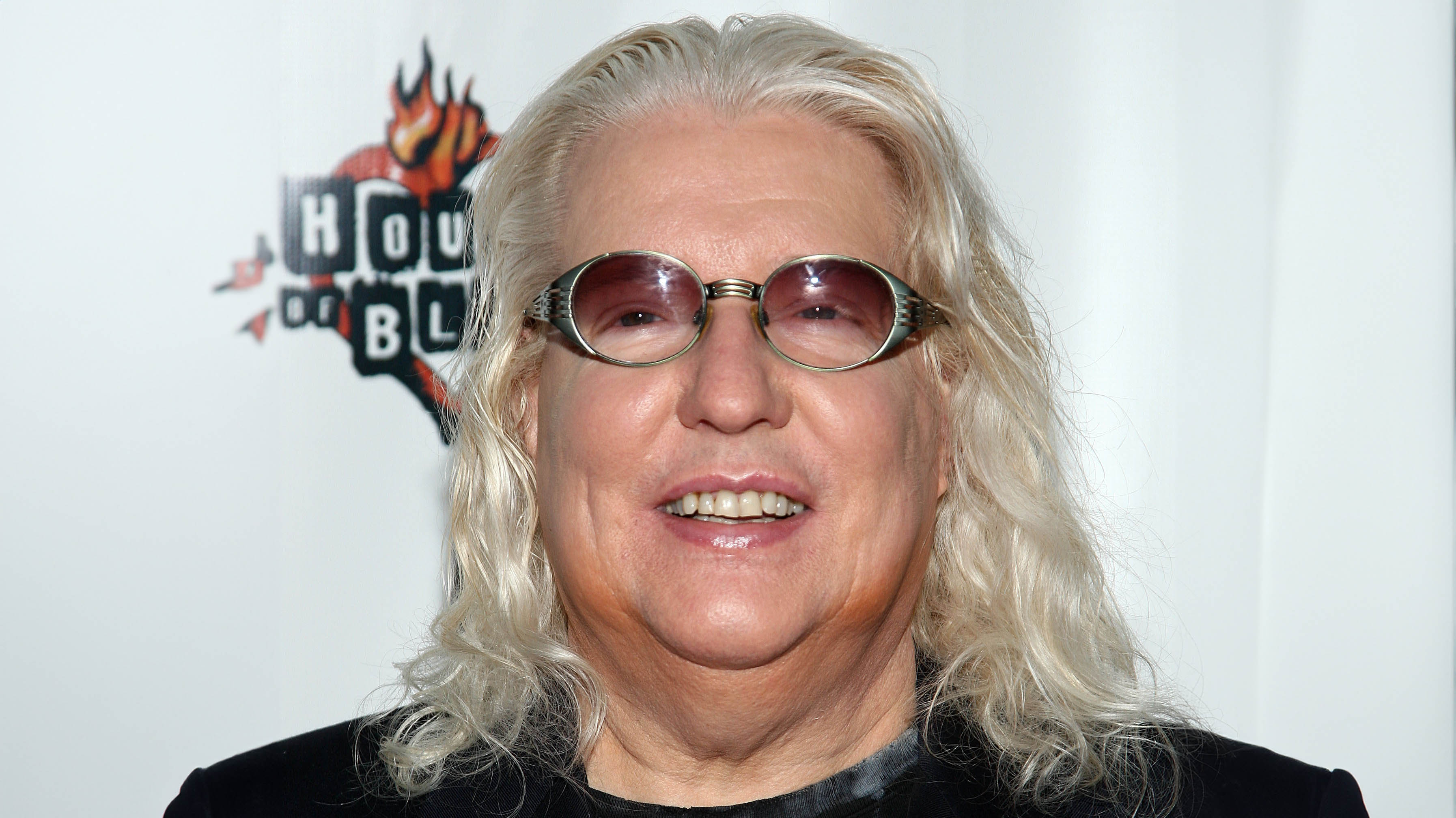Oliver Huntemann: “ I feel at home in the darkness of a good bassline”
The techno DJ and producer has been playing music for well over 30 years, but he still can’t resist the pull of a dark and groovy bassline

Even as a young boy, Oliver Huntemann was hypnotised by electronic music. Listening to the radio at his parents’ home in Oldenburg, just west of Bremen in northern Germany, he would lose himself in the infectious rhythms and dark melodies of Afrika Bambaataa, Depeche Mode, Detroit and, of course, Kraftwerk.
“The problem was that I didn’t really know what electronic music was,” Huntemann explains with a chuckle. “I thought it was just guitar, bass and drums like all the other music I heard. When I joined my first band and we tried to play The Model by Kraftwerk, it sounded nothing like the record.
“It wasn’t until a couple of years later that I saw my first synthesiser, and everything finally began to make sense.”
Young Huntemann cut his teeth DJing at school discos, playing pop hits alongside 12" electro masterpieces from the US. “I could see all the kids looking at each other and wondering, ‘What the hell is this? Why aren’t you playing Michael Jackson?’ But next week, they’d come up to me and ask for some more of the weird music they’d heard.”
As the 80s progressed, he found himself drawn to the new sound that everyone was calling ‘techno’, but his DJ sets would always stretch their net far-and-wide, pilfering plenty of tunes from the non-techno record box. That open-hearted approach still shapes his musical philosophy even today.
Yes, Huntemann is known as a ‘techno’ DJ and producer, but he’ll always try to offer a little something extra. His remix work has taken him from Depeche Mode and the Chemical Brothers to Underworld and Yello, and he’s big mates with Dubfire, aka Ali Shirazinia from Deep Dish.
“Even after all these years of electronic music, it makes me sad to hear people say, ‘You can only play this’ or ‘Everything has to be at this BPM’. Electronic music has been with us a long time, and it’s travelled in many directions. Yes, I like to think I have a ‘style’ or a ‘vibe’, but that might include Chicago house, Detroit techno, Acid, Frankfurt techno, Energy 52, Azuli house, Ghostpoet, Moderat, Portishead or Underground Resistance. For me, music should always be a surprise!”
Get the MusicRadar Newsletter
Want all the hottest music and gear news, reviews, deals, features and more, direct to your inbox? Sign up here.
Have you ever come up with a suitable nametag for your music?
“I stopped worrying about names and labels a long, long time ago. Right back when I was a kid, I wanted to be a ‘musician’, so I started to learn the flute and the guitar, and it was a complete disaster. I had no idea how to express myself and was never good enough to play what I heard in my head.
“I started to wonder what my label was… what I should call myself. Was I a musician who couldn’t play music? And if I can’t play an instrument, am I ever allowed to call myself a musician? If what I play isn’t music, then what do I call it? Can something as simple as one tone from a synthesiser be called music?
“For me, that’s a difficult subject. I’m ashamed when I listen to the acclaimed musicians in this world. A respected classical composer or an arranger. That’s ‘music’. I went to see Arvo Pärt recently, and what I heard was so far beyond everything that I do. After that, I listen to my songs and I say, ‘I’m not a musician’.
“You also have the same questions when it comes to techno or house or trance. What are the rules that decide which is which? And most importantly, does it really matter?
“All of us that are involved in making songs - whether it is classical or techno or pop or whatever – have an important part to play. OK, I cannot score a complicated symphony, but it’s unlikely that a classical arranger would be able to strip down a song for the techno scene.
“I don’t have a recognised musical education, but that means I can create freely and without too many borders. That’s an art, too. To create a sound that’s minimal and very groovy, but not so minimal that the song is stupid.
“If I have a label, then, yes, you can call it techno. Am I musician? OK, I suppose that I play music, but maybe I would prefer to call myself a DJ and an artist. Any more than that, I’m not sure I can answer.”
You’ve never been one to strip back to an ultra-minimal sound, but the new album, Propaganda, does have plenty of space…
“Yes, this was definitely my attempt to create a very simple structure. I wish that there was a magic secret to making the perfect minimal song, but it’s not that easy. You can hear a minimal classic and try to recreate that in the studio, but somehow, it never works. Even after all these years, I’m still searching.
“There are some artists and producers out there who can do this so well. It’s like magic. There’s a 10-minute song and nothing’s happening - but the song is alive and moving all the time. Do you remember [the 1997 album] M-Series by Maurizio? How is that possible? A little bit of filter, a little effect… wow!
“When I was working on Propaganda, I started by stripping the songs back beyond what I was comfortable with. I made them ‘too’ minimal. Then, little by little, I added some simple melodies and little bits of echo, gently building until I found my identity. Sure, it’s minimal, but it also has a structure and feels like a song. This was the first time I really felt happy with my sound.”
If I have a label, then, yes, you can call it techno. Am I musician? OK, I suppose that I play music, but maybe I would prefer to call myself a DJ and an artist.
If you’re aiming for a stripped-down sound, what are the most important pieces of the production? Silly question, but is it always going to be the kick and bass?
“For me, yes. The kick and the bass are the tools that will bring a song to life, even when there’s not much happening in the production. That’s how most of my songs will start: the bass and kick moving together, working out their own groove. Maybe the bassline is so good that it will also become a melody line, too. I like to keep everything very dark - I feel at home in the darkness of a good bassline.
“Maybe that’s because the second electronic instrument I ever bought was a Roland TB-303. If I’m being honest, it was actually three 303s! And I paid about 45 euros for all three! Such a bargain! And so much creativity. Even the most basic basslines - wubb-wubb-wubb - can be full of life.
“As I said earlier, a musical genius can create very complicated music. A bassline with 1000 notes. But there’s also genius in making a timeless bassline with three notes. The 303 is the perfect instrument for that, and it had a very important part to play in my development. Like a synthesiser, it had knobs and controls, but even without musical training, I could understand how to introduce movement into a very simple bassline. It might only be a few notes, but it was never boring.
“I still have those 303s. Even though I don’t use them, I’m not sure I could ever sell them.”
Is it all software basses these days?
“Yes, of course. Over the years, I worked with a lot of hardware. All the Roland family… 101, 106, 303, 606, 707, 808, 909. But the plugins that are available, even to budget studios, are so fat and analogue that there’s no need to stay in the past.
“Sometimes, your heart can get trapped in the past. You look at these analogue machines and they’re beautiful; like works of art. But if you try to introduce them into a modern production, you’ll soon understand why things have moved on.
“Even if you go back only ten years, you can hear how much production values have increased. The sounds that we play in the clubs have developed and evolved to a whole new level. Let’s take the kick drum. At the beginning, I worked with the 808. Then, as we started to move onboard, I sampled the 808 and started to create something new - something that would fit with modern production. Over the years, the science of kick drums has got better and better.
“That time was a wonderful time, and those old Roland machines are part of my history, but we need to leave them in the past. Sure, we can look back and be appreciative of what happened before, but we must look forward. That’s what electronic music has always been for me: it leads me to the future.
“In answer to your question, there are plenty of great synths to choose from today, but most of my basses come from the Arturia collection, especially the Minimoog.”

Along with the simple song structure, do you like to keep actual ‘production’ and mixing to a minimum?
“If you keep a sound absolutely dry, I feel that there’s no life, but too many effects can also ruin everything. It’s a delicate balance, because those little effects can really help to bring the production together… to help all the different instruments sound like they belong in one family.
“There are a lot of producers who like that ‘dry’ sound, but I feel that you need something to give it soul.”
You’ve mentioned Logic in other interviews. Sounds like you’ve been with it for a long time.
“I’ve been there since the very beginning… Creator, Notator, then Logic.”
That’s loyalty!
“Yes, but there have been times when I was unhappy. Everyone knows about the timestretching problems that happened some years ago. And there have been other situations when it seemed that Logic was taking a long time to catch up with everybody else. But the good thing about Logic is that, when they do catch up, they’ll take Logic one step further.
“If I was starting out as a producer today, I’m not sure that I would pick Logic. There is, I think, a big argument for Ableton Live… the way you put a song together feels very comfortable. Even so, I think I’ll always be with Logic because it’s like an instinct for me. I like the way it looks, I like the track-based approach, and it sounds better than the other DAWs.
“All the native synths and production tools are excellent quality, too. In the studio, I work with André Winter, and he’s a big expert with all the fantastic tools you can get today, but, if I’m on my own, I’ll often use the Logic EQs and compressors.
“There are some third-party synths that are important - before, I mentioned Arturia, and we use Albino a lot - but our studio isn’t too full with equipment. I like the idea of having a few things that you’re comfortable with.
“We were looking at a picture of deadmau5’s studio recently and we were like… ‘Wow!’ If you look at our place, it’s very bare. Maybe the studio is like my songs - keep things to a minimum.
“It’s also the same when I play live. I’m a DJ and my job is to play music; I don’t need all the flashing lights and toys. I’m not interested in… I’m not sure what it is in English, but, in German, we call it schnickschnack.”
No 303s or modular tweaker-toys up there on stage with you?
“No way! I tried it, but I soon realised that I’m not a performer. There are a few people like Richie Hawtin and Chris Liebing who can do it well. What Richie does now is crazy! He uses the technology to take his performance somewhere very special.
“But there are also people who use the technology as a disguise. They have all this schnickschnack and it doesn’t add anything to the music. They’re mixing ten different loops and, technically, it’s very clever, but, to the audience, it sounds shit. You’re not reaching people, you’re losing them.
“I have CDJs and a mixer. All I’m doing is presenting the music to people… old-school. I play the tracks and I try to tell a story from beginning to end. If the music is good enough, it shouldn’t need me to add anything.
“People will have their own opinion, of course, but all I can say is that I seem to be doing OK. I’m almost 50 years old and this is still my job. I must be doing something right!”
Over those years, you’ve seen techno music grow from its Detroit origins into a truly global sound. Any idea where we go from here?
OH: “We always talk about Detroit, but it wasn’t only Detroit. Into the equation, we also must bring some of the music that was happening in New York and Chicago. The UK, too, and Germany. OK, there was a time when it was difficult for German DJs to get recognised, but it’s impossible to ignore the influence that places like Berlin and Frankfurt have had on the music we listen to.
“The one thing you do notice when you’ve been in the music business for a while is how much different scenes come and go. There’s a big explosion of something and we’re told it’ll be huge, then, two years later, no one speaks about it.
“I don’t know if I can tell you where techno will travel in the future, but I’m pretty sure it will always be with us.”
Oliver Huntemann’s latest album, Propaganda, is out now on Senso Sounds.


Computer Music magazine is the world’s best selling publication dedicated solely to making great music with your Mac or PC computer. Each issue it brings its lucky readers the best in cutting-edge tutorials, need-to-know, expert software reviews and even all the tools you actually need to make great music today, courtesy of our legendary CM Plugin Suite.
“A fabulous trip through all eight songs by 24 wonderful artists and remixers... way beyond anything I could have hoped for”: Robert Smith announces new Cure remix album
“I have an original 909 – every time I try to use it I feel like I’m ruining it”: House hero Riva Starr on his studio essentials and his love of analogue synths










